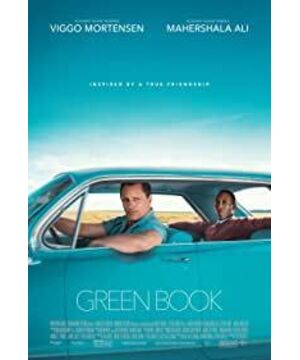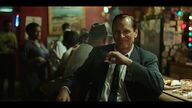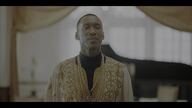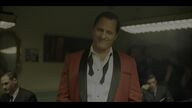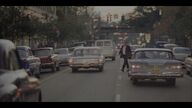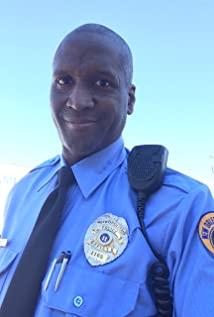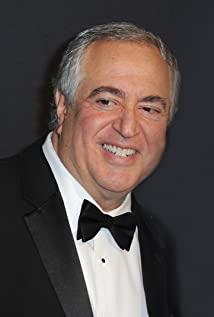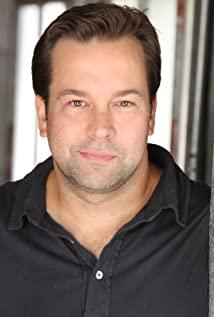Before watching this movie, it’s best to remember about a century of American history from the Civil War to the Civil Rights Movement. After the civil war in the 1860s, black slavery was abolished and a large number of black slaves were liberated. In the short reconstruction period that followed, blacks gained civil rights and began to participate in politics. However, after the Federal Army withdrew from the South, the white-dominated Democratic Party regained power in the South, and gradually deprived the blacks of a series of political and economic rights, which is the so-called dark post-reconstruction period (early twentieth century), especially true. After the implementation of the Jim Crow Act, the social status of blacks basically returned to the state before the Civil War. The main features are (refer to Wikipedia) 1. According to the law, public facilities and education systems are divided into "whites" and "colored people" for exclusive use. 2. Black people are restricted or deprived of the right to vote 3. Economic oppression and employment discrimination against minorities (also Latino and Asian) 4. Violence against minorities.
In response to this series of discriminatory behaviors, ethnic minorities led by African Americans arose the civil rights movement, which reached its peak in the 1960s when the film took place. The civil rights movement mainly used various non-violent means of marches, protests and demonstrations to oppose racial discrimination. The more famous figures include Martin Luther King and so on. It was not until the Civil Rights Act of 1964 that any discrimination based on race, color, religious belief, gender, and country was completely prohibited by law. This film happened on the eve of the enactment of the Civil Rights Act. And Dr. Don Shirley hopes that through the southward tour, people can see the talent and upbringing of blacks, which also coincides with the main thrust of the civil rights movement. In the words of one of his musicians, "In the north, he could have lived a life popular with millions of people, but he wanted to suffer this sin. It is not enough to be a genius. It takes courage to change people's perceptions."
The film begins with the collision between the two protagonists, and gradually rises to the collision between region, race and ideology. Ingeniously and restrained, it shows the social attitudes of the front line of the civil rights movement in the southern hinterland, coupled with the right humor, makes a topic that is easy to cause discomfort to become acceptable and more suitable for the tastes of mainstream audiences.
Tony is a working-class Italian-American with no education. He has a simple brain and well-developed limbs, full of street wisdom. And Dr. Shirley is a well-educated black musician. Dr. Shirley is going to the southern United States for a two-month tour, because Tony's ability to settle the trouble is to hire him as the driver. Tony discriminates against blacks, but he reluctantly agrees because of the money. What's interesting is that Tony, who has both his wife and children, made a decision directly when he heard the salary, and told his wife the decision directly after he went back. And Dr. Shirley, who has no family, is more concerned about Tony's wife's thoughts. When Tony applied for the job, he made it clear that "I am not sure if this job is suitable for a married person, because you will be away from your family for a long time, and you may not even be able to come back for Christmas." Before Tony left, he also called Tony's wife to ask for her forgiveness. Helping Tony write his wife's home letter during the trip may also be out of self-blame. At the end of the journey, when he met Tony's wife in person, he still said sincerely "Thank you for sharing your husband with me." It may be because Dr. Shirley was cold and unkind on the surface, but he yearned for family affection in his heart. And Tony has everything he desires. He is really a typical example of being in blessing and not knowing the blessing.
The collision between the two people was revealed from the beginning of the journey. Tony talked all the way, discussing that the tits in the south must be bigger than the ones in the north. When he saw no one in the shop, he would steal a small stone. When he arrived in Kentucky, he took Dr. Shirley to eat fried chicken and threw the rubbish on the highway. On, plus the lifeless smoking all the way. In contrast, Dr. Shirley's life is full of celebrity concerts, high-end hotels, and eternally elegant language. And Tony would only gambling on the ground with a group of entourages outside while Dr. Shirley was playing, and cheating to win two small bucks. Dr. Shirley regulates Tony's behavior and language a little bit like teaching elementary school students, and the two are judged by their social class.
However, as the journey went south, the social status of the two men reversed. This is also the stage where the main contradiction has transformed from the personal difference between the two protagonists into racial contradictions. The title "The green book" refers to a pamphlet at the time that noted hotels and restaurants in the southern states that were friendly to people of color. The farther south you choose, the more restrictive you choose. Dr. Shirley performed brightly on stage during the day, but at night he could only live in the shabby motel. Tony suggested using his white identity to find a better hotel and the two of them squeezed into a room, but Dr. Shirley insisted that he would not stay in a place where blacks are not welcome. The situation is getting worse. Dr. Shirley began to be beaten, refused to try on a suit, refused to use the bathroom with white people, and finally refused to eat in the restaurant where he was going to perform. Dr. Shirley still maintained a good education despite all kinds of unfair treatment, silently swallowing all the suffering in his belly, and at most secretly shed two tears when looking in the mirror after being beaten. And Tony showed his magical powers at this time. He is very good at picking up people in the police station. Dr. Shirley thought he was too impulsive, and used violence to solve problems at every turn. The interaction between the two in this period is very similar to Tang Seng and Monkey King. In the process of fighting against this series of unfair treatment, Tony gradually stood on the united front with Dr. Shirley. For him, this job is no longer just for money to condescend to drive a black man, but to protect and help a friend, a valuable genius, sincerely.
The conflicts between individuals and races culminated in the final trip to Alabama. Dr. Shirley resisted discrimination for the first time. He refused to perform because the restaurant refused to entertain black people. Instead, he went to a black jazz club nearby to dine with Tony. Dr. Shirley sat down in front of the piano in the club, booed by the waitress. It may be because of compensation for not being able to perform, or it may be to show off his skills for anger, he played a song of Chopin's winter breeze as soon as he started. He once proudly said before that "not everyone can play Chopin as well as me." Playing classical music in a jazz club is absolutely out of date. His sudden performance also surprised the black people eating melons, but then they applauded him sincerely and enthusiastically, and Dr. Shirley smiled shyly. Then the jazz band came to the stage and began to play jazz. Although Dr. Shirley was internally resistant to playing popular music in order to cater to the public, after hesitating for a while, he still cooperated with the band to start playing. Seeing people dancing happily to his music, he became more and more excited when he played, and even couldn't help standing up while playing and twisting his body, like a real jazz player. Dr. Shirley will receive a full house of applause at every performance during the entire journey, and he will also respond with a polite smile. But he has never felt as happy from the heart as in this vulgar jazz club. Because in other performances, he is more like a fighter, supporting every proof of strength with his pride. He is happy to win a war, but he does not have his own talents to bring joy to more compatriots. joy.
After stepping out of the club, Dr. Shirley was still immersed in a happy atmosphere, but shortly afterwards, he had a quarrel with Tony about "Who is blacker". Tony believes that as a working class, he lives in a black neighborhood and understands the life of the black people at the bottom better than Dr. Shirley; while deep in the upper class, Dr. Shirley does not understand what the life of a real black is like. And this just hit Dr. Shirley's sore spot. He lost his demeanor for the first time. Like the heroine of an idol drama, she ran out of the car in the heavy rain, screaming and screaming to tell her inner secret: As a black, he was not recognized by the white, but as a black, he was not at the bottom because he was in the upper class. Accepted by blacks. For a long time, his loneliness and pride collapsed in this rainy night in front of a vulgar white driver. Just tasted the joy of being recognized, but was ruthlessly broken by Tony. Dr. Shirley is a genius in the cracks, poor and respectable. And he is a wonderful character who can connect all the contradictions of personal character, class and race and break out at this moment, creating a perfect drama climax.
There are many other plots in the film that are also remarkable. For example, the experience of being pulled over by the police twice. The first time was to find fault for no reason. After seeing that Dr. Shirley was black, he was even more rude. Tony attacked the police. The two were locked in the bureau together. Later, Robert Kennedy was used (then US Attorney General, John Kennedy). Shirley's younger brother) was only found out, and Dr. Shirley still felt very embarrassed, and blamed Tony for his arrogance. The second time, they were stopped by the police again on the way back. When the police looked at Dr. Shirley, he immediately pulled down his face defensively. The police just reminded them that the rear tire was flat, and politely called them gentlemen. At the end of the journey, Dr. Shirley already regarded Tony as a family member. After hesitating, Dr. Shirley was invited to the Tony’s Christmas dinner with a bottle of wine on a lonely Christmas Eve. After the door opened, Dr. Shirley greeted everyone nervously and shyly. Although Tony's family behaved a little astonished, Tony and his wife welcomed him warmly. The wife even recognized that the beautifully written family letters were actually the credit of Dr. Shirley. (Actually, I think Tony's wife is a well-educated woman, and she misses Tony a lot in terms of talking, parenting, EQ and IQ) The film ends here. Dr. Shirley has returned to the respected and beloved North to continue living, while minorities in other areas are still fighting for their rights. Someone commented that the film’s stereotype was too serious. Not all northerners advocate freedom and the right to peace, while southerners are conservative and discriminate against blacks. There is some truth to this view. Because the civil rights movement at that time did not only take place in the south, minorities across the country were being discriminated against. But the film does a very good job of countering stereotypes on the two protagonists. Let the blacks become a part of a well-educated upper class, while the whites serve as the working class. This idea alone is enough to offset the facial makeup of all other minor characters. In fact, I actually feel that the changes in the attitudes of people around the deep southern hinterland have deepened the dramatic conflict. If you add a few more images of northerners who discriminate against blacks and southerners who are free and equal, not only will the film become stinky and long, but the theme will also be weakened. All in all, the plot arrangement of the film is reasonable, the drama conflict is in place, especially Mahershala Ali's performance is restrained and precise. Let people see that the charm is not distinguished by race, but from the upbringing and beautiful soul.
View more about Green Book reviews


